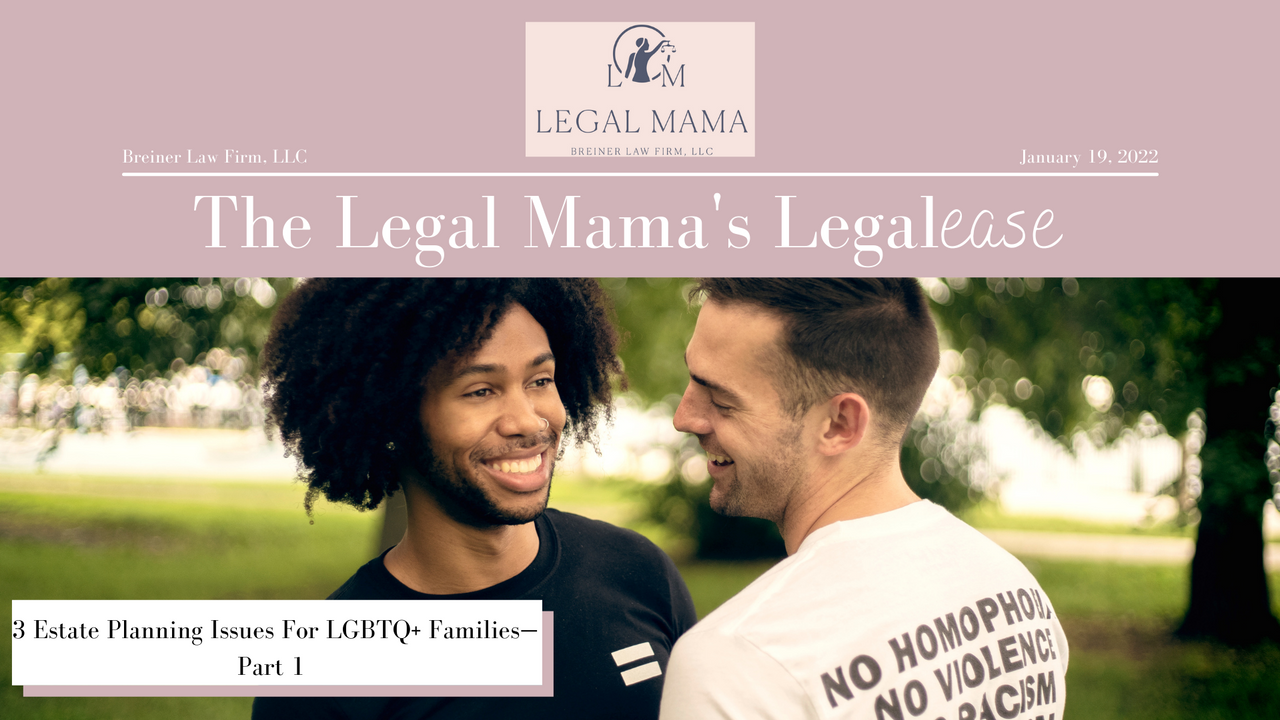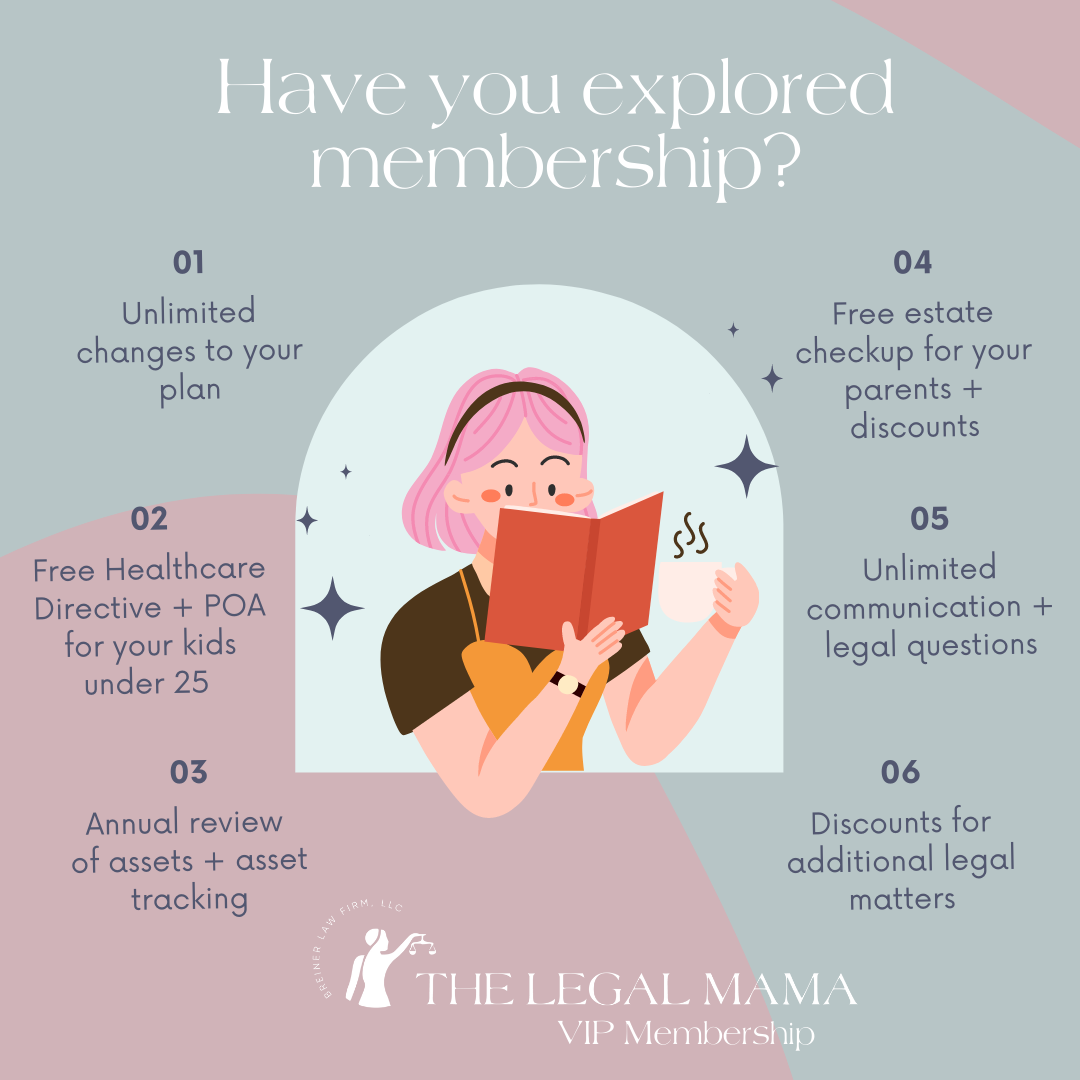3 Estate Planning Issues For LGBTQ+ Families—Part 1
Jan 25, 2022
Whether you are married, in a committed partnership, or buying homes with chosen family (platonic or otherwise), estate planning is about much more than planning for death—it's about planning for life. It's the way to ensure your beloved will be protected and provided for in the event of your death or incapacity. As members of the LGBTQIA+ community, it's more important for us and our families to get a handle on our estates than anyone.
Although marriage equality (for the LGBTQIA+ community) is legally recognized in all 50 states, long-held prejudice at both the political and family level continues to create complications for both married and unmarried queer families. For example, suppose you have family members who are opposed to your marriage/chosen family living situations. In that case, your estate plan may be more likely to be disputed or even sabotaged by unsupportive relatives. This could mean that family members are more likely to contest your wishes, or it might result in custody battles over children in the event of the parent's/caregiver's death.
Unsupportive family members may even try to block the ability of your partner(s) to make medical decisions on your behalf should you become incapacitated by accident or illness. Even worse, your family members could try to kick your partner(s) out of a shared home, if you are in an accident or fall ill, or they may even block your partner(s) from seeing you if you require hospitalization.
Additionally, if you and your partner(s) are unmarried, they would have no rights or protections should you become incapacitated or die without any planning in place, which leaves them vulnerable to several potentially dire risks.
Given these issues, if you are in a Queer family structure (of any kind), you should be aware of several unique considerations regarding your estate plan. Sarah and the Legal Mama team are uniquely able to address your specific circumstances - but, here are three of the most pressing concerns to keep in mind.
- A Will Alone Might Not Be Enough
Suppose you're unmarried and die without any estate plan. In that case, your property will be shared with your surviving family members according to your state's laws through intestate succession. The state's laws would not protect your unmarried partner(s), so if you want your partner to receive any of your assets (including shared homes) upon your death, you need to—at the very least—create a will.
However, having an estate plan that consists solely of a will often doesn’t provide sufficient protection for your spouse/partner/chosen family, and we often recommend that LGBTQIA+ families—even those who are married—create both a will and a trust. Although a will is a foundational part of nearly every estate plan, for a variety of reasons, having just a will could leave your partner/spouse at risk.
Most importantly, a will does not work in the event of your incapacity, which could happen at any time before your death. Should you become incapacitated with only a will in place, your partner/spouse may not have access to needed funds to pay bills, or they might even be kicked out of your home by a family member appointed (by the court) as your guardian during your incapacity.
Furthermore, upon your death, a will is required to go through the often long, costly, and potentially conflict-ridden court process known as probate. In contrast, assets that are properly titled in the name of your trust would pass directly to your partner/spouse/chosen family upon your death, without the need for probate or any court intervention.
If your relationship is not supported by one or both families, avoiding probate is especially important. If a family member doesn’t support your relationship, they are more likely to contest your will during probate.
If your will is successfully contested, this could prevent your surviving partner(s)/spouse from receiving assets you left in your will. The process of contesting is extremely time-consuming, costly, and emotionally draining for your surviving partner(s)/spouse. The process can also keep tens of thousands of dollars wrapped up in the court system for months if not years, rendering whatever money you left them (without a trust) potentially useless for their care/survival.
Typically, when an attorney drafts your will, it is not set up to protect your assets after they are passed to your partner/spouse from creditors or lawsuits. However, leaving your assets in a trust that your partner(s)/spouse can control would ensure the assets are protected from creditors, future relationships, and/or unexpected lawsuits.
- Incapacity Planning is Especially Vital
As we touched on earlier, estate planning is not just about planning for your eventual death; it’s also about planning for your potential incapacity due to injury or illness. Proactive estate planning allows you to name the person (or persons) you would want to make your healthcare, legal, and financial decisions for you if you are incapacitated and unable to make such decisions yourself through a medical power of attorney.
If you haven’t planned for incapacity, the choice is then left to the court to appoint the person(s) to make these decisions on your behalf. If you’re unmarried and the court appoints one of your relatives as your guardian, your family could leave your partner(s) totally out of the medical decision-making process and even deny them the right to visit you in the hospital. And even if you are married, it’s not guaranteed that your spouse would have the ultimate legal authority to make such decisions.
Though the court typically gives spouses priority as guardians, this isn’t always the case, especially if unsupportive family members challenge the issue in court. To ensure your partner(s)/spouse has the ability to make these decisions for you, you must grant them the legal authority to do so using medical power of attorney and durable financial power of attorney.
A durable financial power of attorney gives your spouse the authority to manage your financial, legal, and business affairs, including paying your bills and taxes, running your business, selling your home, as well as managing your banking and investment accounts.
In addition to creating a will and trust, be sure to also create a living will, so that your spouse will know exactly how you want your medical care managed in the event of your incapacity, particularly at the end of life. Finally, don’t forget to provide your partner/spouse with HIPAA authorization within the medical power of attorney, so they will have access to your medical records to make educated decisions about your care.
The Legal Mama team is uniquely positioned to support you and the family structure you have. We can support you in putting in place a robust estate plan that will ensure that your chosen people have the maximum rights possible if you are ever struck by a debilitating accident or illness.
Next week, in part two, we’ll discuss the final estate planning consideration for LGBTQ couples—securing parental rights for the non-biological parent of minor children.
***Please note that this article was edited by a member of the LGBTQIA+ community - language such as "queer" to describe the umbrella of identities is used in reclamation and should not be used by people not belonging to the community.
Click the photo to learn about my unique planning process, which starts with a Family Wealth Planning Session:
Many of the issues in today's article are addressed throughout membership with yearly family meetings. Once you finish your planning, we can help you keep your plan up-to-date and keep your family up to date as well. Membership also offers loads of perks like unlimited communication on your legal needs and more. Just one more way Legal Mama goes above and beyond as your Personal Family Lawyer for Life!

Next ONLINE Webinar:
This article is a service of Sarah Breiner, Personal Family Lawyer®. We don’t just draft documents; we ensure you make informed and empowered decisions about life and death, for yourself and the people you love. That's why we offer a Family Wealth Planning Session,™ during which you will get more financially organized than you’ve ever been before, and make all the best choices for the people you love. What is a Personal Family Lawyer®? A lawyer who develops trusting relationships with families for life.
You can begin by contacting Sarah today to schedule a Family Wealth Planning Session.
Lorem ipsum dolor sit amet, consectetur adipiscing elit. Cras sed sapien quam. Sed dapibus est id enim facilisis, at posuere turpis adipiscing. Quisque sit amet dui dui.
Stay connected with news and updates!
Join our mailing list to receive the latest news and updates from our team.
Don't worry, your information will not be shared.
We hate SPAM. We will never sell your information, for any reason.







